Automag Skid Magnetic Filter
Automated clean filter, flow rates up to 10,000 litres per min.
Hello...
Would you like to visit the Eclipse Magnetics US site to view all relevant content for your location?
Bearings are used worldwide to transfer motion and minimise friction between moving parts. Each year millions of bearings are manufactured. They are used in a variety of devices such as bicycles,and washing machines. Also, industrial equipment such as engines, machine tools and power generation equipment.
They can be made from a variety of materials, often from magnetically permeable materials such as Chrome Steel.
Optimising filtration systems on precision bearing manufacturing operations can have a positive impact. Process efficiencies, waste reduction and quality improvements can all be gained. Read more about magnetic filtration systems.
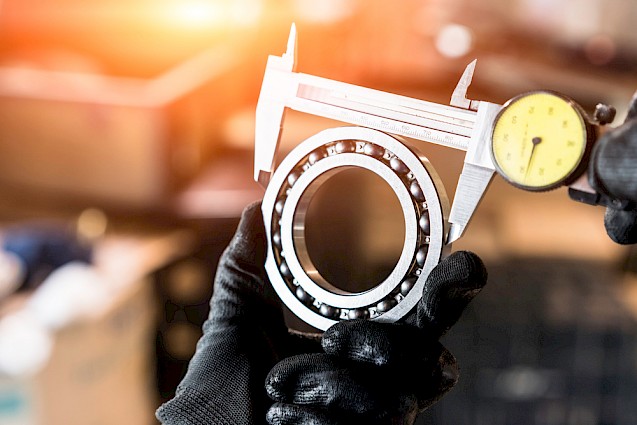
Bearings are key to the efficient, accurate operation of a multitude of machinery and equipment. They are subject to stringent quality standards such as ABEC, ISO or DIN. These determine dimensional criteria such as width, bore diameter, radial rotation, inner and outer ring radius consistency.
In many cases, micron accurate tolerances are stipulated. Performance standards are increasingly more stringent as greater demands for precision, load bearing, and volumes prevail.
Complying with strict tolerances is a big challenge for manufacturers. Fundamental flaws in the manufacturing process can result in expensive product rejects or negatively impact the bearing performance or lifespan.
Sub-standard bearings can cause torque variances or rotational imbalances, increased friction, raised noise levels, shaft misalignment. All of which can adversely affect downtime, the quality of the part being machined and the precise operation of equipment.
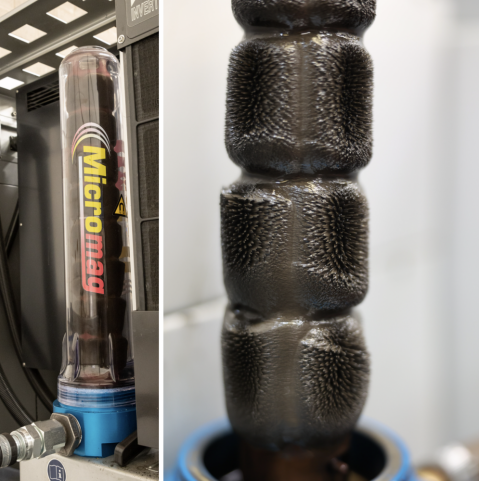
Maintaining clean fluids is an everyday challenge for bearing manufacturers. Ferrous particles created during grinding or super finishing can cause abrasive damage to the product surface. Also impeding equipment such as grinding wheels or honing stones. These impediments can adversely affect precise machining tolerances.
Machine tool and wash system fluids are typically cleaned by traditional barrier filtration methods such as band filters or cartridges. Such media have limited filtration capability, determined by the membrane size. Typically, particles smaller than 10 microns pass through the membrane. They continue to circulate, causing abrasive damage to the surface of the product and finishing equipment.
Magnetic filters are not limited by membrane size, they utilise high intensity Neodymium magnetic circuits and optimum fluid flow dynamics. This combination ensures even the finest ferrous particles are extracted. Ensuring fluids run cleaner and bearing components are protected.
Magnetic filters extract fine particles, however, but they do not strip natural anti-foaming or anti-bacterial additives from the fluids. Read about how Micromag filters reduced reject rates on a bearing polishing operation.
For more information, please contact us .
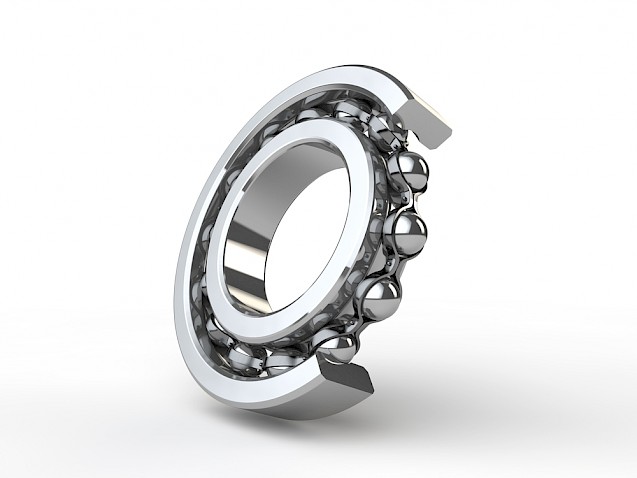
Magnetic filters can offer benefits at several stages within the bearing manufacturing process.
Bearing Ring Cutting or Bar Turning.
Outer and inner rings are usually cut to size on a CNC lathe. This generates ferrous particles, which amass in the fluid and can impede the cutting tool. Although, at the early stage of manufacture, this can influence tolerances and product quality later in the process. Installing a magnetic filter intercepts the ferrous particles, allowing a cleaner, more accurate cut.
Bearing Ring Grinding
Following heat treatment, the rings pass through a grinding process. This fine tunes the geometric shape and surface finish of the faces, bore, and raceway. Grinding tolerances are very demanding, and the influx of fine metal particles, can affect the accuracy of the grind.
Installing a magnetic filter removes fine ferrous particles, ensuring the cleaner fluids do not adversely affect the grinding contact. Normally, the magnetic filter would be used in conjunction with barrier filtration to ensure that both magnetic and non-magnetic debris, such as grinding wheel grit residue, is captured.
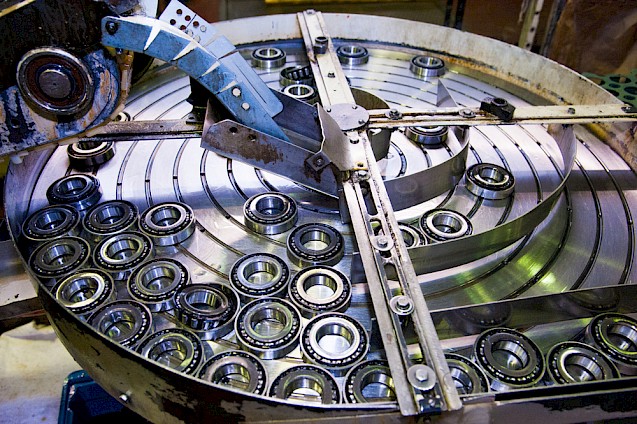
Bearing Ring Honing or Polishing
Following grinding, the rings are subjected to a super finishing process such as honing. This is a critical stage to ensure micron accurate tolerances and the ultimate high performance of the finished product. This stage generates fine ferrous particles, which circulate in the coolant solutions. High intensity magnets extract the finest ferrous particles, ensuring particles do not interfere with the super finishing process.
Ball Bearing Grinding and Lapping
Magnetic filters can be used to enhance the ball geometry and surface finish as they pass through different stages of finishing. During first stage grinding and subsequent polishing or super finishing, it is vital that the fluids are free from fine ferrous particles. Abrasive actions on the ball surface, impedie the grinding wheel contact or lapping abrasive. This can all have a negative impact on micron accurate tolerances.
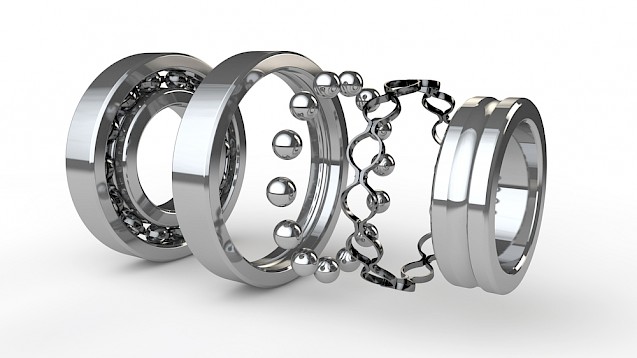
Bearing rings and balls pass through wash stations to remove any residual particles created during finishing. If the wash solution is contaminated, it can lead to surface scratching, minor imperfections, or residual debris on the finished product.
This can impair bearing performance and increase the risk of quality check failure. Magnetic filters are ideal for use on wash systems. They remove the finest ferrous particles and ensure that wash solutions stay free from ferrous contamination.

Protecting the Environment
Many manufacturers are striving to reach "Net Zero" targets, achieve ISO 14001, and fulfil their corporate social responsibility obligations. Magnetic filters can make a significant impact in reducing contaminated waste disposal. Magnetic filters use "free" magnetic energy; they require no consumables or "throw-away" components.
They reduce the burden on traditional filters, ensuring that contaminated filter media usage and disposal are minimised. Maintaining cleaner fluids also increases fluid lifespan, ensuring fluid change frequency is reduced and contaminated fluid disposal is reduced.
Cost Reductions
Magnetic filters offer several benefits for cost reduction and production efficiencies. The fine particle capability is instrumental in reducing expenditure on fluids, consumable filter media, and waste disposal. Also, efficiencies such as reduced maintenance downtime and reduced product reject rates can be achieved.
If you are interested finding out how magnetic filtration can help your business, please get in touch .